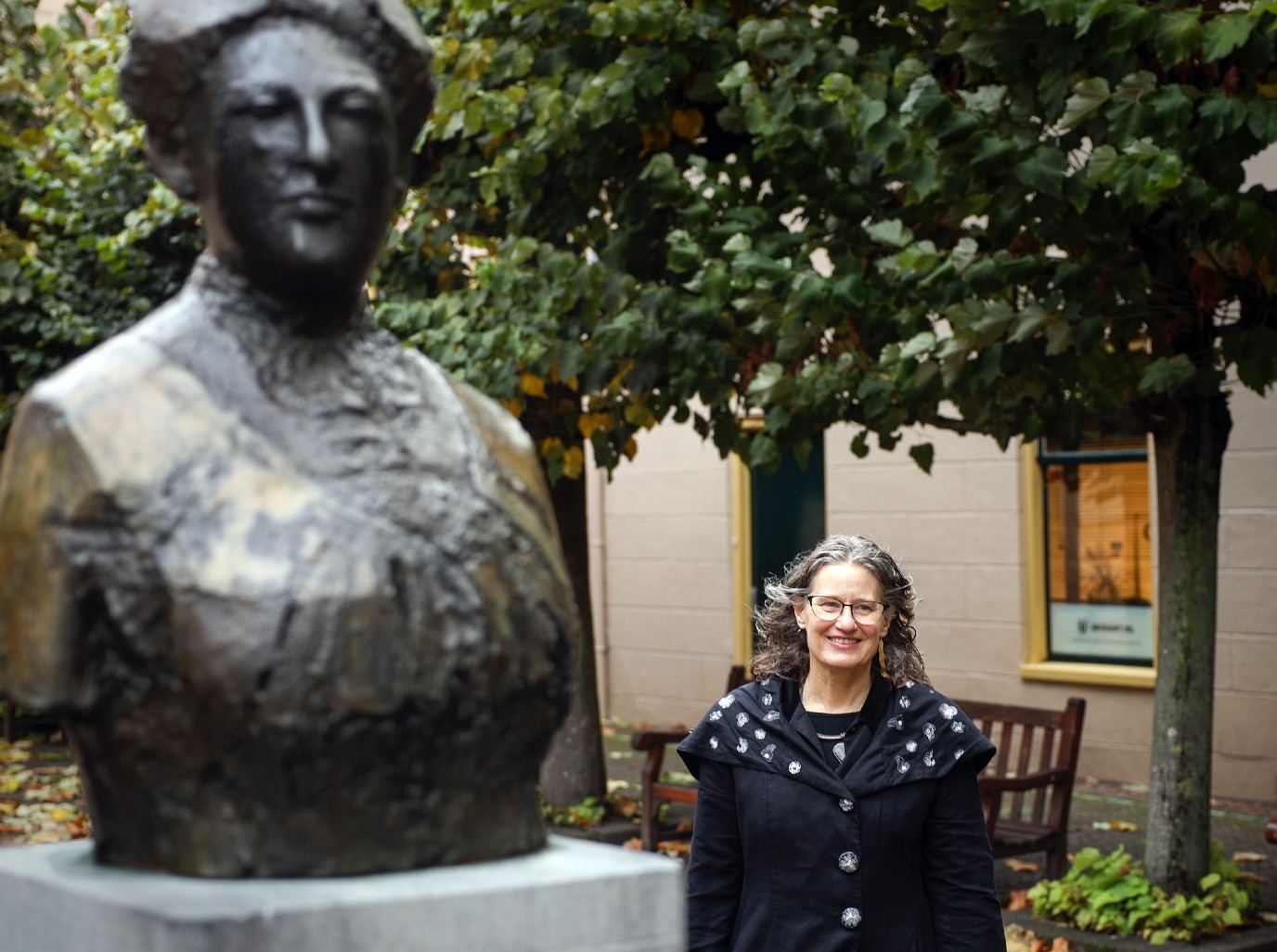What about the wife beater? How language reinforces harmful ideas

Words matter. This should come as no surprise to anyone interested in news, politics, science, or just about anyone who uses language in any form. However, it is about more than ‘just’ finding the right words so we can understand each other. The words we use can have negative connotations that reinforce harmful ideas. Nevertheless, there is also good news. According to Janet Fuller, Professor of Language and Society at the Faculty of Arts, we can also use words to challenge ideas and effect change in society.
Text: Marrit Wouda, Corporate Communication UG / Photos: Henk Veenstra
Dominant ideas
Fuller is a sociolinguist whose work focuses largely on discourse analysis. ‘I'm interested in the role of language in society’, she explains. ‘Words influence the way we see things, and the way we see things influences how we talk about them. When it comes to gender, for example, it should be noted that gender roles do not originate from our language. We have ideas about gender, and our language reflects those ideas, it reproduces them.’ Fuller explains that sociolinguistics often deals with hegemonic discourses, in other words discourses which are dominant. ‘They're dominant because there’s consensus within a society. For example, there are dominant ideas about the ‘right’ way to be feminine,’ she explains. ‘However, those ideas don’t appear out of thin air. Instead, they are dominant because people accept them. But that also means we can challenge them!’

The white wife beater
Because we reproduce and reinforce ideas through language, this process can sometimes be harmful, even when it is not intentional. ‘We don’t consider exactly what we're reproducing when we say things.’ One of her favourite examples is the term used to refer to the white tank-top worn by men: wife beater. It is ‘just’ a name for a casual piece of clothing, but one with some very uncomfortable connotations. ‘By using that name, we're kind of normalizing domestic violence, which I find problematic.’ She continues: ‘In addition, we’re perpetuating certain stereotypical forms of masculinity.’ Indeed, it is not difficult to conjure up an image of a blue-collar worker with a lower level of education, who is physically violent and wears a shirt like that. ‘That's a stereotype; we’re saying these are the people who commit domestic violence. We know that this is not true. We know that domestic violence is perpetrated by all kinds of people.’ According to Fuller, that shows that, without realizing, we perpetuate ideas that are, upon reflection, not something we actually believe in.
Just a joke
Of course, asking people to not use certain words or to use different ones can lead to resistance. ‘Oh, but it’s just a word,’ is the response. ‘That’s very funny to me,’ Fuller says. ‘Because it's a denial of the role of language. If language isn't important, if it's just a word, why can’t you use a different one?’ Another defence is that it is just a joke. Fuller also disagrees with that sentiment. ‘Humour doesn’t stand outside of culture. It relies on culture,’ she explains. ‘We only find something funny if we understand why. So, I think that's a very weak argument.’ It is very clear that words carry added weight, even if that is not our intention. ‘When we see “wife beater” as a normal word, it really trivializes something that’s actually very serious. You can say it's just a joke, and maybe you don’t mean to make fun of men beating their wives, but you’re also not helping to change it.’

Dehumanization
In recent media coverage around femicide, the pyramid of violence has been mentioned. This concept suggests that violence, especially gendered violence, is rooted in stereotypes, sexist remarks, and jokes. This then normalizes worse behaviour further up the pyramid. ‘I would take that a step further,’ Fuller adds. ‘I think that violence is often made possible by dehumanizing people, and that largely starts with language.’ According to Fuller, it starts with talking about people as if they were less worthy and valuable in society — as if they were animals. Talking about groups in that way is the first sign of disrespect, and it can shape how we view someone. ‘The way you talk about groups of people really legitimizes a certain view of them. And then it becomes possible to commit violence against them because they're not really human.’
Stereotypical bins
It is clear that reinforcing stereotypes through language can cause real harm to those affected. ‘But stereotyping doesn’t serve anyone,’ Fuller says. ‘We often talk about men and women as if they’re on opposing each other. However, positioning women in very limiting ways doesn’t serve men well, because that means that they’re also limited and constrained in who they can be. No one profits from placing people in rigid, stereotypical boxes.’
However, there is hope! While language can reinforce certain ideas, we can make conscious choices to challenge them. We are already using language to lessen the emphasis on the gender binary. Using more gender-neutral terms such as ‘flight attendant’ and ‘firefighter’ instead of ‘stewardess’ and ‘fireman’ can make th+ese jobs more acceptable to people of all genders. ‘Using neutral job-titles, as well as neutral pronouns such as the singular “they”, is more inclusive for non-binary people.’ Fuller adds, ‘this is important in itself, but it also shifts the focus away from gender salience.’ The use of gender-neutral pronouns challenges a lot of deeply rooted ideas about biological sex and gender. Fuller sees that it is changing. ‘I've seen the singular “they” being used in ways that aren't specifically about gender inclusivity. I don't do this naturally, but my kids say things like: “This man came to the classroom, and they gave a presentation.” That's just how they use language.’ That’s a good thing,’ Fuller thinks. ‘We need to keep challenging those outdated and harmful ideas, because that can truly change the world for the better.’
More information
More news
-
19 January 2026
Digitization can leave disadvantaged citizens in the lurch
-
13 January 2026
Doing good in complex situations
